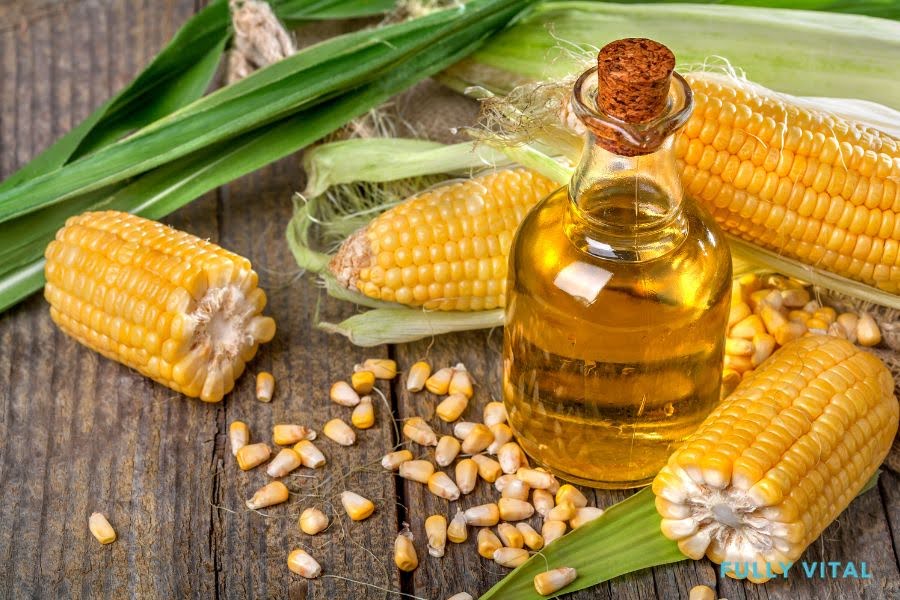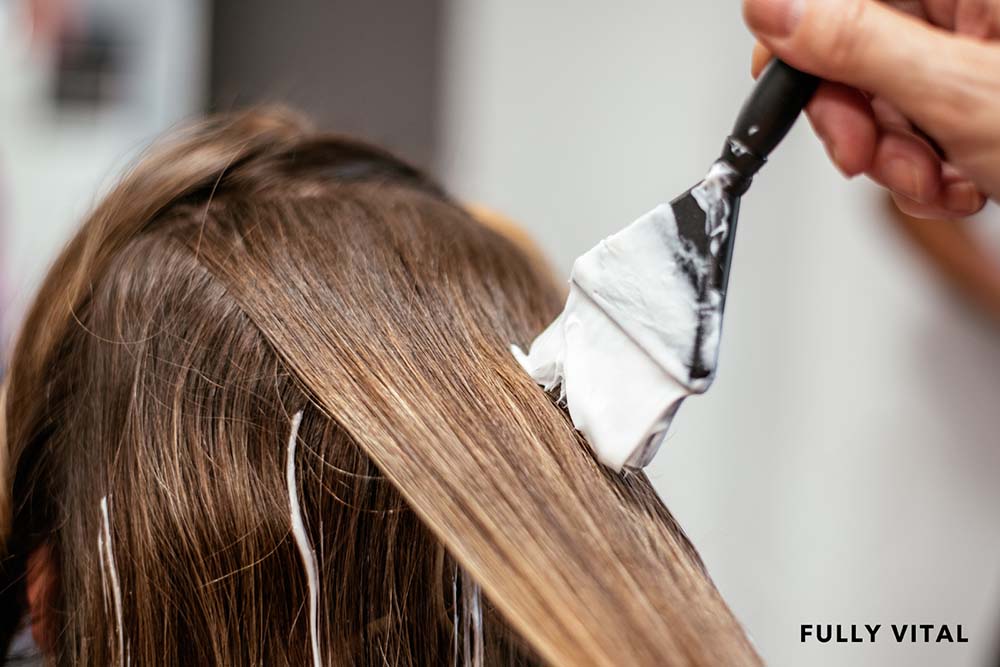
Propanediol: An Essential Ingredient for Hair Growth
Hello, beautiful! Are you interested in finding easy ways to make your hair grow faster and look amazing? Well, you're in luck.
I really care about having healthy and beautiful hair, so I've tested many things to find the best way to take care of it.
One thing that has really impressed me is propanediol.
It's a fantastic ingredient that can make a big difference in helping your hair grow better.
I'm excited to tell you all about it and how it can change the way you take care of your hair.
If you're eager to unlock the secrets of fully vital hair growth and stimulate your hair to grow beautifully, don't wait any longer.
Discover our amazing hair growth products and start your journey to healthier, luscious locks today!

I LOVE MY HAIR NOW
FullyVital hair serum and hair vitamins made tremendous improvements in my hair. I truly love my hair now.
Dorit S.,
Is Propanediol Pore Clogging?
Propanediol is not considered to be pore-clogging or comedogenic.
It is generally recognized as safe for use in skincare products and does not have a tendency to block pores or promote the formation of comedones.
However, it's important to note that skin reactions can vary from person to person, so if you have sensitive or acne-prone skin, it's always a good idea to conduct a patch test before incorporating a new product into your skincare routine.
What Is Propanediol Made From?
Propanediol, an increasingly common ingredient found in many personal care and cosmetic products, is recognized for its versatile properties and safe usage.1
Understanding what this ingredient is made from will provide better insight into its applications and benefits in various industries.
Natural Sources of Propanediol
Propanediol is often derived from natural sources, marking its preference among clean beauty and skincare formulators.2
One of the most common sources is corn sugar, also known as glucose, obtained from corn.
This glucose is fermented using specific types of yeast or bacteria, converting it into propanediol in a sustainable and eco-friendly process.
Sustainable and Biodegradable
The production of propanediol from corn sugar does not only leverage renewable resources, but it also results in a biodegradable product.3
This aspect of propanediol's production has garnered attention from green beauty brands looking to minimize environmental impact without compromising on product effectiveness.
Synthetic Production
There is also a synthetic variant of propanediol, which is known as propylene glycol.
Although propylene glycol and propanediol have similar names and properties, they are different compounds.
Propylene glycol is traditionally derived from petroleum-based feedstocks in a chemical process, and as such, it is less favored by brands aiming for natural ingredient profiles.
Can Propanediol Cause Irritation?
While propanediol is often lauded for its effectiveness in skincare products, it is essential for individuals with sensitive skin to understand its potential for causing irritation.
This ingredient is present in a variety of personal care products, so exploring its irritant potential and safety profile can help consumers use such products more confidently and comfortably.
Skin Sensitivity Varies
Skin sensitivity to propanediol can differ widely among individuals.
Most users will not experience any irritation, as propanediol is generally recognized as a safe and gentle ingredient with a lower irritation potential than some other similar synthetic ingredients.
Signs of Irritation
Those with more reactive skin should look out for signs of irritation, which may include redness, itching, burning, or dermatitis.
If any of these symptoms occur after using a product containing propanediol, it could indicate sensitivity to this ingredient.
Precautionary Measures
To minimize the risk of irritation, consider performing a patch test before incorporating a new product into your skincare routine.
Patch testing involves applying a small amount of the product to a discreet skin area and monitoring for adverse reactions over a period of 24 to 48 hours.
Is Propanediol Organic?
Propanediol can be naturally sourced, but the term "organic" has different meanings in chemistry and consumer labeling.
In chemistry, "organic" refers to carbon-containing compounds, including propanediol.
In consumer products, "organic" implies sourcing from materials grown under specific agricultural standards.
Propanediol from certified organic corn fermentation can be considered organic for consumers.
To confirm, check for certifications like USDA Organic on product labels, ensuring it meets organic production criteria.

What Percentage Of Propanediol Is Used In Skin Care?
The percentage of propanediol used in skincare formulations can vary depending on the product's intended use and desired performance.
Propanediol serves as a humectant, solvent, and emollient, with the concentration in a product typically ranging from 1% to 20%.
In products where propanediol is primarily used as a solvent or to enhance the absorption of other ingredients, it might be present at lower concentrations, often around 1% to 5%.
When it's used as a humectant to attract and retain moisture in the skin, its concentration could be higher, potentially up to 10% to 20%.
However, it's important to note that these percentages are general guidelines.
The actual amount of propanediol used in a product will be determined by the manufacturer based on various factors, including the desired viscosity, the interaction with other ingredients, and the overall purpose of the product.
For precise concentrations in a specific product, one should refer to the ingredient list or contact the manufacturer directly.
Products typically list ingredients in descending order of concentration, so if propanediol is listed at the top, it's present in a higher percentage.

Discover the Power of Fully Vital Hair Growth ProductsAt Fully Vital, we have developed a range of hair growth products that are designed to address the specific needs of aging hair. Our products have been formulated using powerful, science-backed ingredients that have been shown to slow down and even reverse the signs of aging in hair. Here are some key features and benefits of our products:
If you are ready to experience the benefits of our hair growth products, why not give them a try today? Take the first step towards healthier, more youthful-looking hair with Fully Vital. |
Final Thoughts On Propanediol
Propanediol is an essential ingredient for hair growth products.
Its ability to penetrate the hair shaft, provide hydration, and enhance the absorption of other key ingredients makes it a valuable asset in the quest for stronger, healthier hair.
At Fully Vital, we recognize the importance of propanediol and incorporate it into our science-backed hair growth products.
By choosing hair growth products containing propanediol, you can effectively stimulate hair growth, improve hair texture, and maintain overall hair health.
Whether you have fine, curly, straight, or coily hair, propanediol can benefit all hair types, helping you achieve the luscious locks you desire.
At Fully Vital, we are committed to formulating high-quality products that deliver results.
Our mission is to empower women to take control of their hair health and embrace their natural beauty.
With propanediol at the core of our formulations, our products are designed to slow down and reverse the aging of your hair, giving you the confidence to flaunt your gorgeous mane.
Invest in your hair with Fully Vital's propanediol-infused hair growth products, and experience the transformative power of this essential ingredient.
Say hello to strong, vibrant hair that reflects your inner vitality.
Check out our recent blogs:
- Effective Strategies For Scalp Yeast Infection Relief: Understanding Causes, Symptoms, And Treatment Options
- Expert Guide: Can You Safely Bleach Wet Hair? Essential Tips Revealed!
- Ultimate Guide To Styling Korean Bangs: Tips, Trends & Techniques
Frequently Asked Questions About Propanediol
What role does propanediol play in hair growth?
Propanediol is primarily used in hair care products for its hydrating properties and its ability to enhance the absorption of other ingredients.
While propanediol itself is not directly linked to promoting hair growth, it supports a healthy scalp environment by helping to maintain moisture levels, which can indirectly contribute to better hair growth conditions.
It acts as a humectant, solvent, and emollient, creating a formulation that keeps scalp and hair conditioned and receptive to growth-promoting ingredients.
Is propanediol safe for use in hair products?
Propanediol is considered safe for use in hair products and is generally well-tolerated by many individuals.
It is a popular alternative to propylene glycol, as it is less likely to cause irritation.
Propanediol is also appreciated for its non-toxic nature and effectiveness in personal care formulations, and it is commonly used in a variety of hair care products, from shampoos to conditioners, and styling aids.
Does a higher concentration of propanediol increase hair growth rate?
There is no evidence to suggest that a higher concentration of propanediol directly correlates with an increased rate of hair growth.
Propanediol's primary function in hair products is as a moisturizer and solvent, not as a hair growth stimulant.
The inclusion of propanediol in hair growth products is to assist with the delivery and efficacy of active ingredients that do contribute to hair growth.
Can propanediol be used on all hair types?
Propanediol can be used on all hair types as it is a versatile ingredient with hydrating properties that benefit both the hair and scalp.
Due to its gentle nature, it is suitable for normal, dry, oily, or even sensitive scalps.
As always, it's advisable for individuals with specific hair concerns or sensitivities to patch test any new hair care product.
What makes propanediol an essential ingredient for hair growth?
Propanediol is considered essential in hair growth products not because it stimulates growth directly, but because it helps create an optimal environment for hair growth.
Its moisturizing capabilities prevent scalp dryness, and its ability to enhance the absorption of active ingredients ensures that hair growth stimulants are more effective.
Does Propanediol have any side effects?
Like any cosmetic ingredient, propanediol has the potential to cause side effects, although they are generally rare and mild.
Possible side effects include irritation, redness, or an allergic reaction in those with sensitive skin.
It's always recommended to perform a patch test prior to use to minimize the risk of adverse reactions.
What is the difference between propanediol and propylene glycol?
Propanediol and propylene glycol are both used as humectants and solvents in cosmetic formulations, but they differ in their chemical structure and properties.
Propanediol is considered to be a less irritating and more natural alternative to propylene glycol.
Although they can be used interchangeably in some products, propanediol is often preferred for individuals with sensitive skin or those seeking natural product options.
Is propanediol a natural or synthetic ingredient?
Propanediol can be either natural or synthetic, depending on the source and method of production.
Natural propanediol is typically derived from corn sugar through fermentation, while synthetic propanediol can be created from petroleum-based chemicals.
The product label or manufacturer can provide information on whether the propanediol in their formulation is from a natural or synthetic origin.
Are there clinical studies on propanediol’s effectiveness in hair growth?
As of now, there isn't clear evidence from clinical studies that propanediol directly affects hair growth.
Instead, its effectiveness in hair care products is attributed to its role in improving texture, stability, and moisture retention, as well as aiding in the delivery of active ingredients that may themselves promote hair growth.
Can propanediol cause an allergic reaction?
Although propanediol is generally well-tolerated and considered safe for cosmetic use, it can cause an allergic reaction in some individuals.
This is particularly true for those with sensitive skin or allergies to specific ingredients.
Symptoms of an allergic reaction may include itching, redness, or irritation.
If you suspect an allergic reaction to a product containing propanediol, it's best to discontinue use and consult a dermatologist.
Sources:
- Bom, S., Jorge, J., Ribeiro, H. M., & Marto, J. (2019). A step forward on sustainability in the cosmetics industry: A review. Journal of Cleaner Production, 225(0959-6526), 270–290. https://doi.org/10.1016/j.jclepro.2019.03.255
- Benson, H. A. E., Benson, H., Roberts, M. S., Leite-Silva, V. R., & Walters, K. (2019). Cosmetic Formulation: Principles and Practice. In Google Books. CRC Press. https://books.google.com.ph/books?hl=en&lr=&id=Dp-RDwAAQBAJ&oi=fnd&pg=PA221&dq=Propanediol+is+often+derived+from+natural+sources
- Bozell, J. J., & Petersen, G. R. (2010). Technology development for the production of biobased products from biorefinery carbohydrates—the US Department of Energy’s “Top 10” revisited. Green Chemistry, 12(4), 539. https://doi.org/10.1039/b922014c







